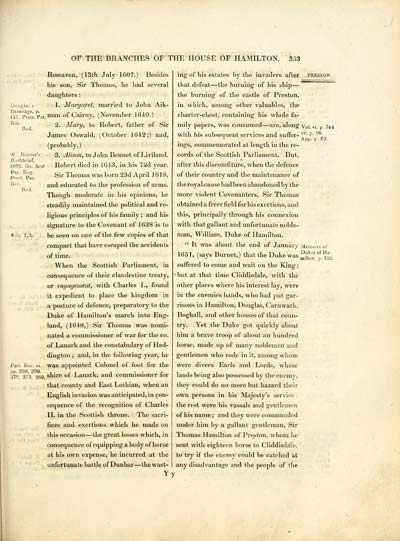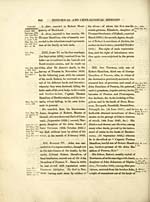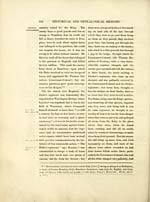Historical and genealogical memoirs of the House of Hamilton
(367) Page 357
Download files
Complete book:
Individual page:
Thumbnail gallery: Grid view | List view

OF THE BRANCHES OF THE HOUSE OF HAMILTON. 353
Prest. Par.
Roc.
Ibid.
Rossaven, (13th July 1607.) Besides
his son, Sir Thomas, he had several
daughters :
rias's 1. Margaret, married to John Aik-
Hl.'p^sLpar. man of'Cairny, (November 1640.)
RcC "lb,J 2 - Mar y> to Robert, father of Sir
James Oswald, (October 1642;) and,
(probably,)
v i Jennet's 3. Alison, to John Bennet of Liviland.
Hirthbrief, .
1696. Gr. Seal Robert died in 1643, in his 7 2d year.
Sir Thomas was born 23d April 1618,
and educated to the profession of arms.
Though moderate in his opinions, he
steadily maintained the political and re-
ligious principles of his family ; and his
signature to the Covenant of 1638 is to
a v. i.,b. be seen on one of the few copies of that
compact that have escaped the accidents
of time.
When the Scottish Parliament, in
consequence of their clandestine treaty,
or engagement, with Charles I., found
it expedient to place the kingdom in
a posture of defence, preparatory to the
Duke of Hamilton's march into Eng-
land, (1648,) Sir Thomas was nomi-
nated a commissioner of war for the co.
of Lanark and the constabulary of Had-
dington ; and, in the following year, he
ParL Re.-, vi was appointed Colonel of foot for the
pp. 298, 299. , . ~ T , , . . c
372, 373. 389. shire ot Lanark, and commissioner tor
that county and East Lothian, when an
English invasion was anticipated, in con-
sequence of the recognition of Charles
II. in the Scottish throne. The sacri-
fices and exertions which he made on
this occasion — the great losses which, in
consequence of equipping a body of horse
at his own expense, he incurred at the
unfortunate battle of Dunbar — the wast-
Y
ing of his estates by the invaders after presxoh.
that defeat — the burning of his ship — ""
the burning of the castle of Preston,
in which, among other valuables, the
charter-chest, containing his whole fa-
mily papers, was consumed — are, along Vol. »i. p. 5»<k
with his subsequent services and suffer- "'" p- 98 "
1 App. p. 69.
ings, commemorated at length in the re-
cords of the Scottish Parliament. But,
after this discomfiture, when the defence
of their country and the maintenance of
the royal cause had been abandoned by the
more violent Covenanters, Sir Thomas
obtained a freer field for his exertions, and
this, principally through his connexion
with that gallant and unfortunate noble-
man, William, Duke of Hamilton.
" It was about the end of January Memoirs of
1651, (says Burnet,) that the Duke was ^".'"m.
suffered to come and wait on the King ;
but at that time Cliddisdale, with the
other places where his interest lay, were
in the enemies hands, who had put gar-
risons in Hamilton, Douglas, Carnwath,
Boghall, and other houses of that coun-
try. Yet the Duke got quickly about
him a brave troop of about an hundred
horse, made up of many noblemen and
gentlemen who rode in it, among whom
were divers Earls and Lords, whose
lands being also possessed by the enemy,
they could do no more but hazard their
own persons in his Majesty's service :
the rest were his vassals and gentlemen
of his name ; and they were commanded
under him by a gallant gentleman, Sir
Thomas Hamilton of Preston, whom he-
sent with eighteen horse to Cliddisdale,
to try if the enemy could be catched at
any disadvantage and the people of the
Prest. Par.
Roc.
Ibid.
Rossaven, (13th July 1607.) Besides
his son, Sir Thomas, he had several
daughters :
rias's 1. Margaret, married to John Aik-
Hl.'p^sLpar. man of'Cairny, (November 1640.)
RcC "lb,J 2 - Mar y> to Robert, father of Sir
James Oswald, (October 1642;) and,
(probably,)
v i Jennet's 3. Alison, to John Bennet of Liviland.
Hirthbrief, .
1696. Gr. Seal Robert died in 1643, in his 7 2d year.
Sir Thomas was born 23d April 1618,
and educated to the profession of arms.
Though moderate in his opinions, he
steadily maintained the political and re-
ligious principles of his family ; and his
signature to the Covenant of 1638 is to
a v. i.,b. be seen on one of the few copies of that
compact that have escaped the accidents
of time.
When the Scottish Parliament, in
consequence of their clandestine treaty,
or engagement, with Charles I., found
it expedient to place the kingdom in
a posture of defence, preparatory to the
Duke of Hamilton's march into Eng-
land, (1648,) Sir Thomas was nomi-
nated a commissioner of war for the co.
of Lanark and the constabulary of Had-
dington ; and, in the following year, he
ParL Re.-, vi was appointed Colonel of foot for the
pp. 298, 299. , . ~ T , , . . c
372, 373. 389. shire ot Lanark, and commissioner tor
that county and East Lothian, when an
English invasion was anticipated, in con-
sequence of the recognition of Charles
II. in the Scottish throne. The sacri-
fices and exertions which he made on
this occasion — the great losses which, in
consequence of equipping a body of horse
at his own expense, he incurred at the
unfortunate battle of Dunbar — the wast-
Y
ing of his estates by the invaders after presxoh.
that defeat — the burning of his ship — ""
the burning of the castle of Preston,
in which, among other valuables, the
charter-chest, containing his whole fa-
mily papers, was consumed — are, along Vol. »i. p. 5»<k
with his subsequent services and suffer- "'" p- 98 "
1 App. p. 69.
ings, commemorated at length in the re-
cords of the Scottish Parliament. But,
after this discomfiture, when the defence
of their country and the maintenance of
the royal cause had been abandoned by the
more violent Covenanters, Sir Thomas
obtained a freer field for his exertions, and
this, principally through his connexion
with that gallant and unfortunate noble-
man, William, Duke of Hamilton.
" It was about the end of January Memoirs of
1651, (says Burnet,) that the Duke was ^".'"m.
suffered to come and wait on the King ;
but at that time Cliddisdale, with the
other places where his interest lay, were
in the enemies hands, who had put gar-
risons in Hamilton, Douglas, Carnwath,
Boghall, and other houses of that coun-
try. Yet the Duke got quickly about
him a brave troop of about an hundred
horse, made up of many noblemen and
gentlemen who rode in it, among whom
were divers Earls and Lords, whose
lands being also possessed by the enemy,
they could do no more but hazard their
own persons in his Majesty's service :
the rest were his vassals and gentlemen
of his name ; and they were commanded
under him by a gallant gentleman, Sir
Thomas Hamilton of Preston, whom he-
sent with eighteen horse to Cliddisdale,
to try if the enemy could be catched at
any disadvantage and the people of the
Set display mode to:
![]() Universal Viewer |
Universal Viewer | ![]() Mirador |
Large image | Transcription
Mirador |
Large image | Transcription
Images and transcriptions on this page, including medium image downloads, may be used under the Creative Commons Attribution 4.0 International Licence unless otherwise stated. ![]()
| Histories of Scottish families > Historical and genealogical memoirs of the House of Hamilton > (367) Page 357 |
|---|
| Permanent URL | https://digital.nls.uk/95394191 |
|---|
| Description | A selection of almost 400 printed items relating to the history of Scottish families, mostly dating from the 19th and early 20th centuries. Includes memoirs, genealogies and clan histories, with a few produced by emigrant families. The earliest family history goes back to AD 916. |
|---|

